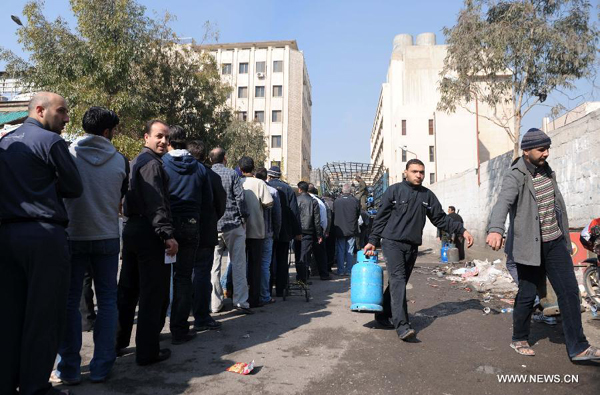Arab League approves sanctions against Syria
 0 Comment(s)
0 Comment(s) Print
Print E-mail
China.org.cn, November 28, 2011
E-mail
China.org.cn, November 28, 2011
The Arab League (AL) Sunday approved tough sanctions against Syria to press the country to end its violent crackdown against anti-government protesters.
Syria failed to sign a protocol before Friday, the deadline over the visit of an AL observer mission.
The sanctions included a travel ban against senior Syrian officials and politicians, the suspension of business with the Syrian Central Bank and the end of Arab-financed projects in the country, New York Times reported on Sunday.
It will be another blow to the country's economy, which is suffering from sanctions imposed by the European Union and the United States, it said.
The package also included suspending the trade with the Syrian government except for some strategic commodities, freezing the government's funds in the Arab countries, assigning the Arab central banks to monitor loans concerning Syria, and halting financial transfer from the Arab central banks to the Syrian Central Bank except for the remittance of overseas Syrian workers to their families and citizens of Arab countries in Syria, Xinhua reported.
"Today, we are very sad to hold such a meeting as the Syrian government has not signed the observer mission," said Qatari Prime Minister Sheikh Hamad bin Jassim al-Thani.
"Syria is an important regional country. We are very concerned about the Syrian crisis. So we made the decision," he said.
Jassim noted that the sanctions will avoid bringing harm to the Syrian people and will not affect their lives directly or indirectly.
The sanctions got support from 19 members of the 22-member pan-Arab body except for Iraq and Lebanon. Syria's membership was suspended on Nov. 16.
According to the resolution, a technical implementation committee will submit a report about the flights between Syria and other Arab countries so that the AL can decide the time for a flight ban.
The committee is also charged with naming a list of strategic commodities.
The technical committee comprises high officials and experts from Arab countries including Jordan, Algeria, Saudi Arabia, Sudan, Oman, Egypt and Morocco.
The AL ministerial committee, which is in charge of handling the Syria crisis, will convene regularly to discuss the Syrian situation.
"Some countries mentioned about the political sanctions in the next step, including the withdrawal of ambassadors and cutting diplomatic ties with Syria, but the AL has not considered such a move," said AL Secretary General Nabil Arabi.
He said the sanctions would bring pressure upon the Syrian regime and the AL would consider the consequences of the sanctions and try to avoid any foreign interference in Syria.
Jassim said they were committed to solving the crisis within the Arab framework. But if the Syrian situation continues, they would consider seeking foreign help.
He added that for the time being, the AL would not establish the humanitarian corridor, but would see what the Syrian government would do next.
Dozens of anti-government Syrian nationals gathered at the Fairmont Hotel Sunday in eastern Cairo where the Arab foreign ministers met.
A protester said he opposed the foreign interference and hoped that the Syrian problem be solved within the Arab nations.
Meanwhile, hundreds of angry Syrians thronged a main square in the capital Damascus in a show of defiance and grumpiness to the AL, just minutes after the regional bloc decided to impose sanctions against Syria.
Syria became the second member state punished by the AL this year after Libya due to their handling of domestic protests.
Anti-government protests erupted in Syria in March, leaving around 3, 500 people killed in clashes. The Syrian government blamed the armed groups for launching attacks.






